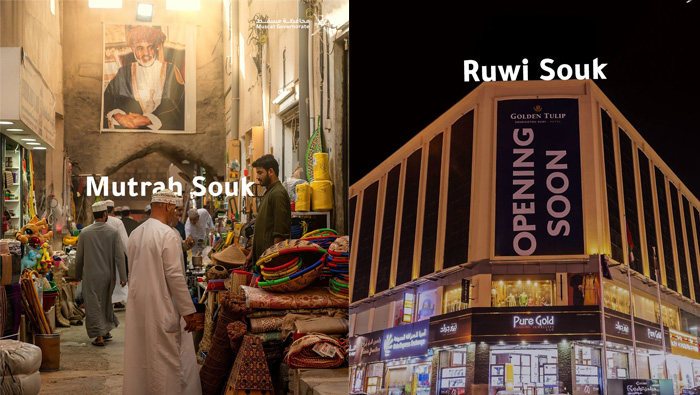
The traditional markets in Muscat Governorate are commercial and cultural landmarks rooted in Omani memory, merging the spirit of heritage and modern commerce to reflect the cultural identity and uniqueness of Omani society. These souks are vibrant centres that unite sellers, handicraftsmen and shoppers of all ages, and are significant attractions to visitors and tourists. The most remarkable souks include Mutrah Souk, Seeb Souk, Friday Market and Ruwi Souk, each featuring its own unique character and experience.
Muttrah Souq - The most Ancient and Famous Souq
Muttrah Souq is the most ancient and well-known souq in Oman. It dates back more than two centuries and reflects a lively past through its narrow alleys and close shops offering various goods such as jewellery, gold, traditional clothing, perfumes, frankincense, Omani luban, antiques, gifts, handicrafts, and handmade products. This Souk has 1,274 commercial shops, creating a vibrant centre of shopping and community interaction.
A part of the souq is known as the ‘Dark Souq’ for its many alleys and passages shaded by wooden canopies, providing visitors a unique experience like walking through a museum. This market extends from the Masjid Al Rasool Al A’dham to the two gates of Khor Bemba Muttrah (Muttrah Darwaza), and is famous for selling embroidered fabrics, traditional jewellery, and artistic products that amaze visitors with their beauty and precision.
A visit to Muttrah Souq is also worth a visit to the neighbouring Attarin Souq, east of the Dark Souq, selling the highest quality frankincense, perfumes, luban, and natural herbs used in traditional medicine.
These markets are close to the Rahbiyyin Souq, which consists of neighbouring stores offering diverse spices, nuts, dates, Omani coffee and other foodstuffs that attract shoppers from both within and outside the governorate.
Seeb Souq: Commercial diversity in the City Centre
Seeb Souq is the most diverse market in Muscat Governorate, occupying approximately 5,200 square metres, comprising 125 commercial stores and 28 tabrizas. It includes several sections including garments, accessories, perfumery, frankincense, spices, and specialised markets such as vegetables and fruits market, meat market, fish market, and coffee market. This market is an ideal daily shopping destination of families and residents, known for its competitive prices and various products. As well as, the traditional vibes reflecting the spirit of the place, place, creating a unique visiting experience.
Friday Market: A Weekly Vibrant Gathering Place
It is held in the Wadi Al Kabir on Fridays and is regarded as a traditional consumer market that fulfils the all visitors’ requirements, offering new and pre-used items at competitive prices. This market runs from the early morning hours until 9pm, and is most popular on special occasions, especially during the Eid al-Fitr and Eid al-Adha as a seasonal traditional Eid market. When it becomes a vibrant and cheerful festive centre. This souk is a model for popular markets and is similar to seasonal markets that promote commercial mobility and offer various options at appropriate prices. It enables local merchants and artisans to display products and initiate small businesses through market stalls. Thus, this market introduces a social and cultural aspect that connects people to their heritage and creates an enjoyable and spirited shopping experience.
Ruwi Souq: Various Services and Goods
It is one of the most energetic and lively markets in Muscat Governorate, which is located along the Hamriyah Roundabout to the Ruwi Roundabout. It marked by various shops ranging from gold and jewellery, textiles, clothing, clothing, exchange companies, travel and tourism offices, electronics stores, banks, household items stores, and producing paintings and glass. This souq serves residents and represents the meeting point of various cultures and nationalities.
Markets and the Place Memory
The traditional markets in Muscat Governorate are unique and attractive. They reflect the social and cultural identity of Omani society. They offer a source of income to artisans and shopkeepers, contribute to boosting economy and community interaction, and create job opportunities. They also reflect the city’s humanisation and social diversity, with different needs and lifestyles, linked closely to the place’s memorable experience, and the uniqueness of Omani society and its ability to combine traditional heritage with modernism. Thus, these markets are key destinations for shoppers and tourists, which support the economic and cultural position of Muscat Governorate.